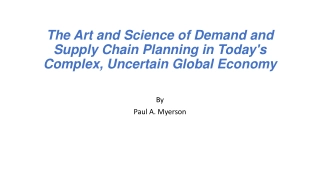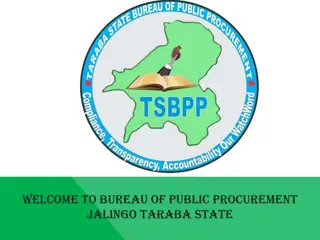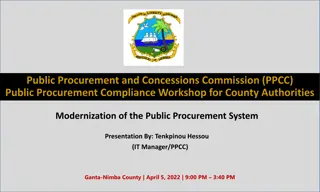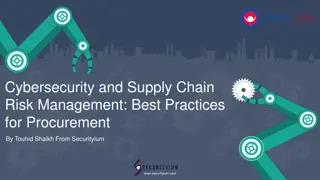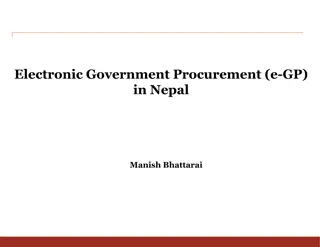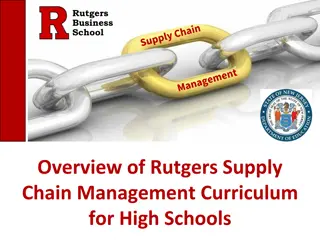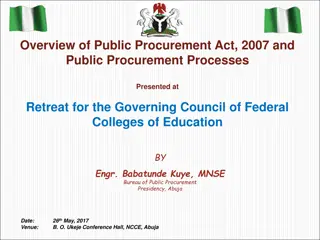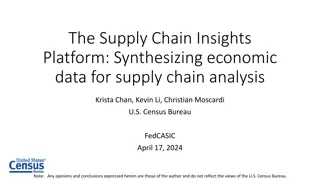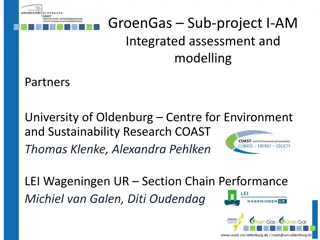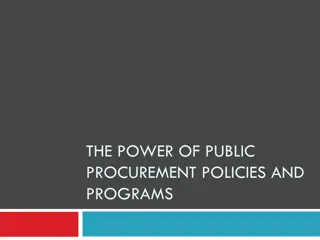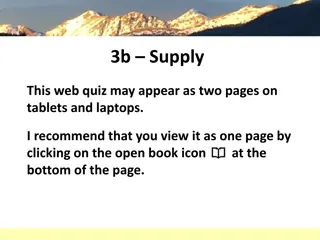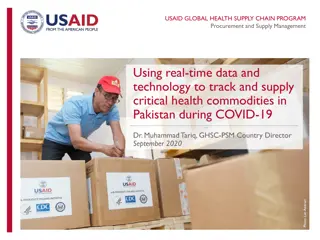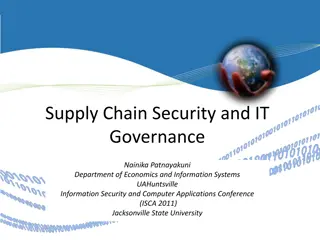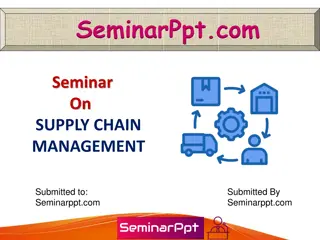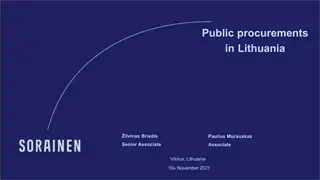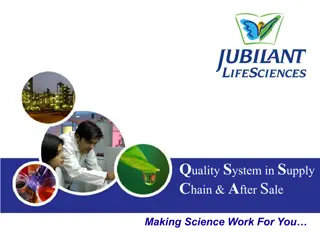Challenges and Opportunities in Public Procurement and Supply Chain Management
Public procurement and supply chain management are crucial systems that require all stakeholders to fulfill their roles for stability. Challenges such as capacity issues, misconceptions, and demand management affect the efficiency of the system. It is essential to address these issues and leverage opportunities for improvement to ensure responsive and effective SCM practices.
Download Presentation

Please find below an Image/Link to download the presentation.
The content on the website is provided AS IS for your information and personal use only. It may not be sold, licensed, or shared on other websites without obtaining consent from the author. Download presentation by click this link. If you encounter any issues during the download, it is possible that the publisher has removed the file from their server.
E N D
Presentation Transcript
PUBLIC SERVICE COMMISSION (PSC) VIRTUAL ROUNDTABLE 28 October 2020 Ms Rakgadi Motseto 1
BACKGROUND 1. Supply Chain Management or Public Procurement should be viewed a system; 2. It is build on a chain of strategic decisions and actions; 3. A failure in one area of the chain creates a negative reaction in other areas of the system; 4. For this chain to remain stable, it requires all parties responsible, affected and impacted by these processes to do their part; (i.e. SCM practitioners, Accounting Officers, Accounting Authorities, the Higher Learning Institutions, Oversight bodies, the public in the form of businesses transacting with government, etc.) 5. The broader government system needs an SCM that is responsive than reactive. 2
MISCONCEPTIONS RELATING TO SCM Perceived symptoms of a dysfunctional SCM system from AGSA report/Media Reports With every report/ing SCM is painted dismally Non-payment of Suppliers Invoices are processed by Finance Irregular Expenditure Finance (CFO) Critical positions vacant for extended periods DPSA, AOs, HR managers unrealistic job requirements Lack of consequence management Line managers, Trade Unions, Employee Relations and Accounting Officers for also not initiating restriction of suppliers Financial Misconduct CFOs and AOs Systems downtime - SITA 3
SCM PROCESS Demand Management (60%) The pre-tendering stage is where most planning and policy consideration occur; All the demands on SCM should be implemented in this phase (All policies BBBEE, Empowerment, Transformation, Youth, Women, People with disabilities, Local Content, Promoting local products, Local Economic Development etc.) Acquisition Procurement - (30%) Tendering where a procurement or buying decisions are implemented Too late to consider all the policy demands Logistics (10%) Post-tendering phase to manage contracts, suppliers and organisational performance Disposal lifespan exhausted (Finance) Source: National Treasury, (2003) 4
CAPACITY CHALLENGES IN SCM Ever-changing policies (2017 PPPFA Regulations, coming PP Bill) Increasing demands (Infrastructure, GBVF, Health, Service Delivery). Lack of expertise within the system Reliance on Consultants Policy Demands Supply Chain Management (SCM) capacity in the State NO fitting qualification (use experience rather) Internship Prog. 1 2 years Minimum requirement entry level 3yrs experience SMS Generic Assessments Recruitment No Public Sector SCM Qualification The lecturers have no understanding of the SCM system Curriculum for CFOs Finance there is no SCM modules HLIs 5
BROADER SYSTEMS CHALLENGES IN ICT Department of Science & Innovation Other institutions SITA Government is struggling with Data Management SARS, AGSA, DHA, STATSSA, DPSA - No interfacing Incubation of ICT Graduates There is no central point for data housing, no interfacing (Officials resign to avoid misconduct and resurface elsewhere within the system) In-house developed solutions are not replicated in other institutions. Reliance on private ICT companies 6
ICT CHALLENGES IN SCM Central Supplier Database Selection of suppliers (Quotations) Supplier Database Manual or existing with limitations (Logis, Walker, Oracle, SAP, etc.) Prone to Human error or manipulation Procurement Systems Expenditure is not consolidated (BAS, SAP, Oracle etc.) Unclear where the funds are spent to measure performance on socio-economic targets Payment Systems 7
COVID-19 LESSONS The system has proven to be reactive in Procurement; Institutions have over or under procured items required; Suppliers have overstocked and waiting for the 2nd wave of the virus SCM officials did not have the expertise in health procurement; Then how do we enforce consequence management? The requirement is development and training before implementing punitive measures. The public is not fully informed on the role of government; Developing policies to benefit the public without adequate educating the public is futile The public s learning is left to media and social media; Poor quality products supplied; Will there be any consequences for suppliers and officials? 8
PUBLIC PROCUREMENT BILL - UPDATE The draft Public Procurement Bill (PPB) was published on 19 February 2020 for public comment in Government Gazette No. 43030. The initial closing date was 31 May 2020 and it was duly extended to 30 June 2020. 9
PROPOSED AMENDMENTS Incorporates Infrastructure Procurement and Public Private Partnership procurement methods; Introduces an Alternative Dispute Resolution (ADR) mechanism for review and reconsideration of procurement decisions made by procuring entities; Proposes the establishment of an independent Tribunal to review administrative actions taken by a provincial treasury or the regulator; Proposes the repeal of the existing PPPFA as well as amendments to other pieces of legislation such as PFMA, MFMA, etc. 10
OVERVIEW OF THE BILL Consists of 10 chapters that are divided into different number of parts, eliminating fragmentation in laws which deal with procurement in the public sector by amongst others: Chapter chapter chapter chapter chapter 1.Definitions Part 1: Public procurement Regulator Procurement Integrity Preferential Procurement Procurement Methods and bidding Processes 2. Objects, of Act Framework for preferential treatment Part 2: Provincial Treasuries 3. Application and Administration of Act Part1: General Methods Part 3: Procuring Institutions Part 2: Bidding Process Part 3: Transversal Procurement Part 4: PPP 11
OVERVIEW OF THE BILL Chapter Chapter chapter chapter chapter General Provisions Disposal of Assets Dispute Resolution Infrastructure Delivery Management Part 1: Application of this Chapter Part 2: Infrastructure Procurement and delivery mngt by depts, constitutional institutions and 3A and 3C public entities Part 3: Infrastructure Procurement and delivery mngt by major PEs, gov business enterpri- ses, munics & muni entities. Part 4: Gateway review process Supply Chain Management Part 1: SCM System Part 2: Institutional Arrangements Part 3: Demand Management Part 4: Acquisition Management Part 5: Contracts and Contracts Mngt Part 6: Logistics Mngt Part 7: Movable asset Mngt -Delegation -Limitation of liability -Documents to be made available -Database of prospective suppliers -Offences -Exemption -Deviation -Regulations -Transitional arrangements -Repeal of laws - Short title and commence- ment Part 1: Reconsideration and review Part 2: Reconsideration by procuring institution Part 3: Provincial recon- sideration procedure Part 4: National reconsideration procedure Part 5: Review 12
COMMENTS PER CHAPTER Chapter 5 has received most comments, followed by Chapter 6, chapter 1 and chapter 2 TOTAL Chapter 8 1% Chapter 9 6% Chapter 1 13% Chapter 7 5% Chapter 10 10% Chapter 6 14% Chapter 2 13% Chapter 5 24% Chapter 3 9% Chapter 4 5% 13
WAY FORWARD & NOTING Capacity The NSG has conceded to using government officials to facilitate some of the training, than use consultants; Engaging the NSG to develop a similar SMS pre-entry (Nyukela) assessment for SCM officials; Source one of the HLIs to develop a strategic program for SCM managers (planning, strategic sourcing, contract management, supplier development); Other parts of government should align the policies that tend to clash (recruitment and placements); Education for all stakeholders impacted by SCM processes. ICT The absence of an automated process should not be the reason for wrong doing or disregard for prescribed processes; Reduce the continuous development of new ICT solutions for individual use in institutions. 14
END Thank you! Comments? 15




